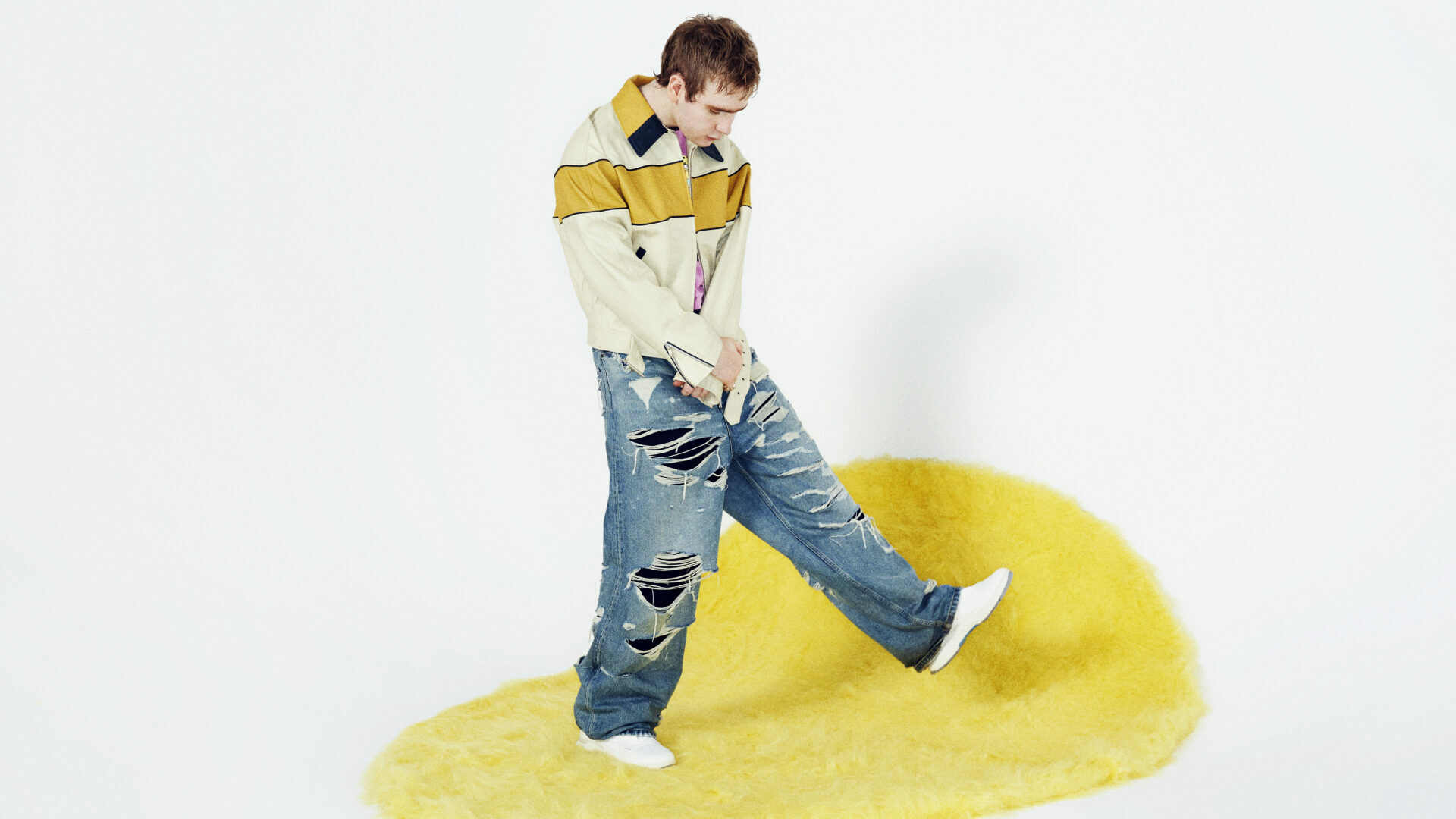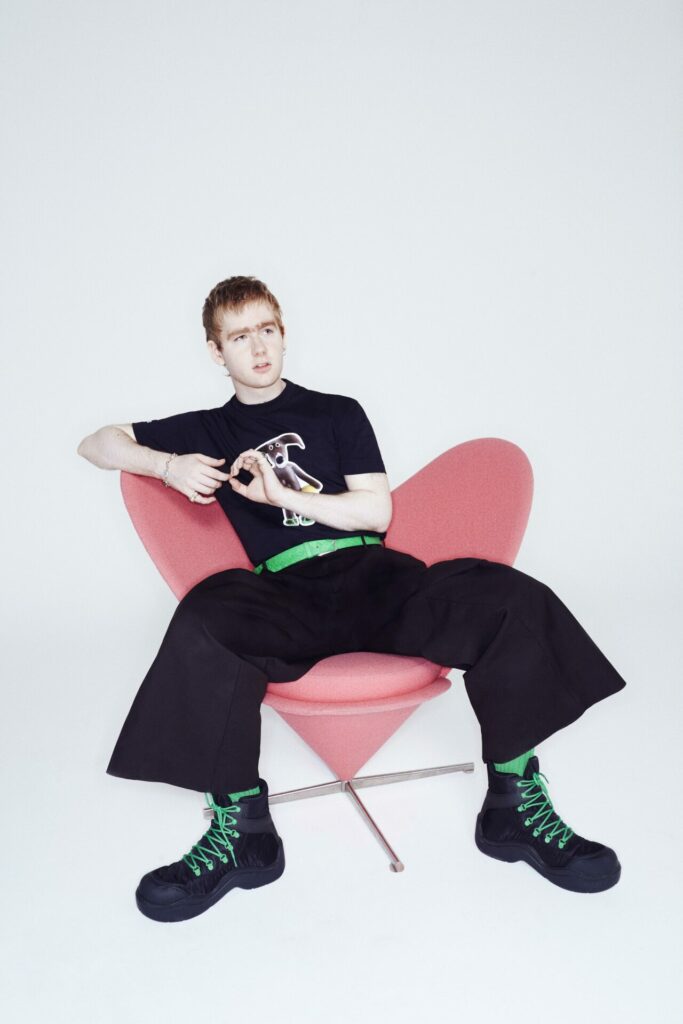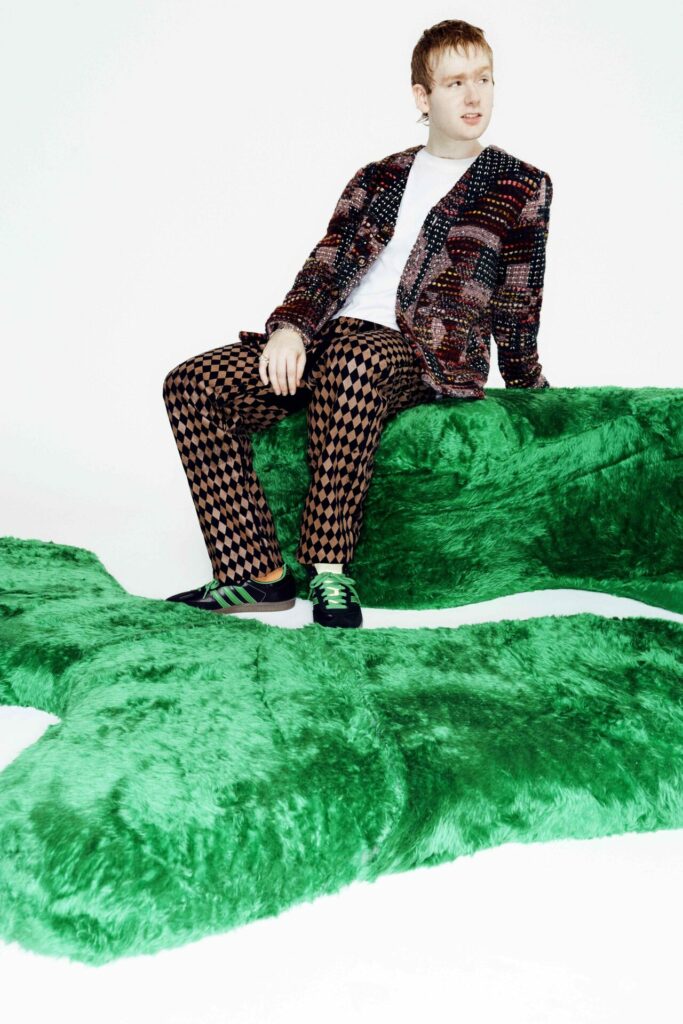Mura Masa just wants to have fun
After surprising everyone with the introverted, punky ‘R.Y.C.’ in 2020, Alex Crossan is back with ‘demon time’, a third album that sees him pivot again into UK garage, drill, and hyperpop

Mura Masa sees himself as something of a musical Mystic Meg. The Guernsey-born, south London-based producer — real name Alex Crossan — says he can feel forthcoming trends in his gut, and then follows them with glee.
“I’m a keen observer,” he says from his home studio in Peckham in early September, “and I really enjoy noticing when things are popping up.”
In 2017, Crossan emerged with a self-titled debut album that saw him traverse dance, hip-hop and beyond with little care for the supposed boundaries between them. Musically, it established a few constants that have emerged throughout his career over the years: whether making lo-fi emo or steel drum-filled bangers, there’s an emotional intensity that drives all of his work.
Mura Masa scored Crossan some genuinely huge radio hits (‘Love$ick’ with A$AP Rocky and ‘1 Night’ with Charli XCX) and even earned a Grammy nomination. But by the time it came to write his second album, 2020’s R.Y.C. (Raw Youth Collage), Crossan “felt quite strongly that guitar music would be important in the next couple of years”, and made a record that was a stark departure from the party styles of his debut. Across the divisive but brilliantly conceived second record, he made a rowdy punk rager with slowthai (‘Deal Wiv It’), introverted, sparse emo (‘Raw Youth Collage’), and full-on pop-punk (‘Vicarious Living Anthem’).
“There was a real hunger in the audience for music that gives permission for people to let loose a little bit”
— Mura Masa
The curveball of R.Y.C., and the reaction that followed, allowed Crossan to reach the place he finds himself in now with the release of his third album, demon time. “There was this groundswell of feeling like, ‘That’s not really what we wanted from you!’” he says, reflecting on the response to album two. “And I was like, ‘I know, I apologise for that. Stay tuned, there’ll be something else!’” Still, in the years following the album’s release, Crossan believes he was vindicated in his stylistic decisions on the album. “The whole pop-punk thing has really exploded again,” he says. “You’ve got Willow Smith and Machine Gun Kelly having big guitar music moments.”
By the time Crossan returned home from the R.Y.C. tour and went almost immediately into lockdown, he was hearing the continuation of these softer, more introspective turns from pop stars on Clairo’s quiet, homely Sling and Lorde’s pivot on Solar Power. “Maybe I arrived at the depression party a little early,” he laughs. His head, however, was turning yet again, thinking about what people would need after this period of soul-searching in the pandemic. “What I should be doing is imagining a future where we’re allowed to hang out and snog each other again, and letting that be the motivating force,” he remembers telling himself. “I thought that there was gonna be a big kick back.” (Recently, that’s taken form in albums by Beyoncé, and Drake: “It’s a return to house music as a way of abandon,” Crossan says.)
After the introspection of R.Y.C., he began searching for a more joyful, exuberant sound. “Maybe I’ve timed it correctly,” he says. “Maybe I’m too late.”

demon time is a “zag to the last album’s zig”, as Crossan puts it with a grin. It sees him flip the script once again, recruiting Pa Salieu, Shygirl, PinkPantheress, Lil Uzi Vert, and more for an album that flirts with UK garage, drill, hyperpop, and beyond. It’s tied together by the underlying concept — and original working title — of “fun”.
‘Demon time’, Crossan explains, is a phrase born out of lockdown in the United States to describe the early hours of the morning, when “people are up to no good”. The new album carries this mischievous, rule-breaking energy. When he was introduced to the saying by Shygirl, it lined up with one of his future visions flawlessly. “The phrase perfectly captured something that I’d been feeling a desire for in pop culture,” he remembers. “We really were robbed of so much hedonistic fun during the pandemic, and there was a real, real hunger in the audience for music that gives permission for people to let loose a little bit.”
From the moment Brooklyn-based pop star BAYLI opens the album by repeating “It’s demon time!” in a wicked, devilish whisper, Crossan’s binding mission statement of fun is pushed to the very front. Elsewhere, first single ‘2gether’ puts the yearning acoustic guitars of R.Y.C. into the demon time universe with the help of the enigmatic Gretel Hänlyn on vocals, while slowthai is back for more on ‘up all week’, a playful ode to all-nighters. Shygirl appears twice on the album, including on delightful highlight ‘hollaback bitch’, which rubs noughties R&B against filthy house and lets Shy battle it out with Channel Tres.
“This album is a zag to the last one’s zig”
— Mura Masa
Her second turn is part of an all-star cast on ‘bbycakes’, a flip of 3 of a Kind’s UK garage classic from 2004. The track is what set the whole ball rolling for what would become demon time in the first place — after being unable to focus enough to create new music in the first lockdown, inspiration only struck when Crossan was playing around with ‘Baby Cakes’ on his CDJs. “I just sped it up a little bit and thought, ‘Oh, you can put a drill beat under this!’, so frantically threw something together. You could get into philosophical musings about flipping old classics or whatever, but I was just having fun, and that was revelatory at the time.” With Lil Uzi Vert giving the track a US flavour (he didn’t know the song, Crossan says, but was “just vibing off it”), it simultaneously plays into and subverts ideas of nostalgia by pushing a UK classic into a new context.
The rest of demon time saw Crossan meticulously choosing which guests appear when, and how to meet them halfway on music that neither would have created anywhere else. “It’s quite an art form, sticking together all these people and getting them comfortable with what it is that they’re being a part of,” he says. “It’s never just like I’m throwing people on. I really want them to be excited about the album concept and the idea of being thrown together with this gang of misfit people that shouldn’t really appear on the same record together. It took me a while to assemble the Avengers of fun.”
One staple ingredient Crossan looked for in all his collaborators was a subversiveness, or “something a little bit controversial” in their musical taste and presentation. He wanted people whose music is “quite specialised to their audience,” before taking them completely out of that comfort zone. For example, Afrobeats star Midas the Jagaban appears on ‘slomo’, a thumping dance track that allowed her to step out of her lane and subvert expectations, instead of being recruited by Crossan as ‘the Afrobeats person’. “I was encouraging her along and asking, ‘What is it that you want to make? What would you make if no one was looking?’”

Born in Guernsey in 1996, Alex Crossan’s musical upbringing ranged from getting swept up in the island’s metalcore scene to playing acoustic sets with his brother and lusting after the UK’s rave scene from afar. From 2013, he began uploading twisted remixes of Kanye West and old soul classics on SoundCloud, imbuing every track he picked apart with an already signature energy full of excitement and exploration. For those listening closely enough, the clues to the philosophy at the core of the Mura Masa we hear today have been gestating for many years.
Crossan describes himself as a curator as well as a musician and producer, and thrives in a role where he’s bringing people together and acting as puppet master. “I’m the arbiter of every decision on these albums,” he says, “and in that way, I’m really putting my opinion on the page.” While R.Y.C. saw him expose his singing voice for the first time, he says demon time is “more of a true representation of what I want to be doing than ever before.”
Crossan is striving for this curator role as well outside of his own music, too. He’s currently in the process of building a new studio in the heart of Peckham, which he plans to rent out free of charge to local artists and make part of the south London artistic community. “It’s going to be a nine-room studio with a real emphasis on social spaces,” he explains. “It came as an idea off the back of this album. As I try and become some sort of Gen Z Warhol, I really wanted to create a factory-style space where people can be coming and going and meeting each other.” A second season of Mura Masa and NAO’s 3T workshop course, which launched in the pandemic to help more Black women break into the live music space, has also just wrapped, with graduates now employed on tours by Beyoncé, Coldplay, and Mura Masa himself. “People really want diverse crews more than ever,” Crossan says. “It’s about offering them a space and information — you can work in live music if you want, it’s not all grumpy old white men.”
“I think where I sit best is just following momentary inspirations and not letting a grander picture get in the way”
— Mura Masa
Crossan is building a career around an ethos and set of principles rather than a sound. While no genre will ever define the Mura Masa project, it’s the rule-breaking energy that ties everything together. “I think where I sit best is just following momentary inspirations and not letting a grander picture get in the way,” he says. “I don’t really have a roadmap, but to me that is way more exciting than saying, ‘Yeah, the next one is going to be a drill album.’”
Reflecting on his ever-changing sound and risk-taking approach, Crossan says: “I just wanted to free myself by opening myself up to a little bit of criticism. I definitely would do it again.” He has as little an idea of where Mura Masa’s sound will go after demon time as his fans do, but that’s the point. The release of album three proves that he’ll always be searching for new sounds and feelings, constantly following his gut.
“I fully recommend it to anyone who’s struggling with their difficult second album,” he says. “Just do something you want to do, don’t worry if everyone hates it, and then you can move on from it. Then you’re free.”
Mura Masa’s new album demon time is out 16 September.
